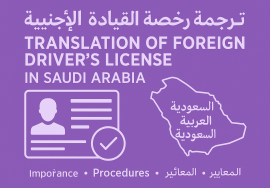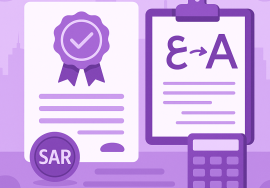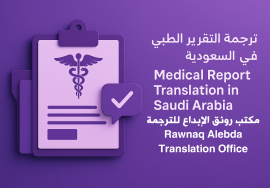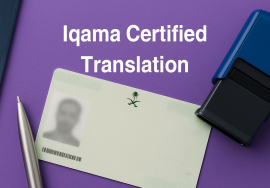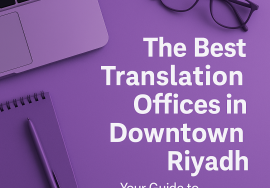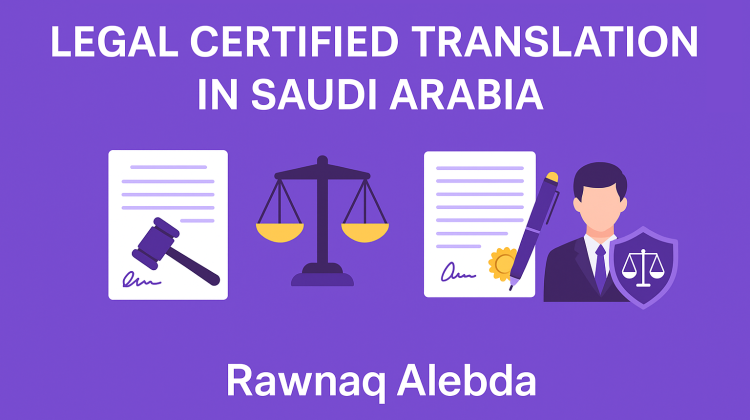
Legal Certified Translation in Saudi Arabia Importance and Standards
Table of Contents
In the Kingdom of Saudi Arabia, legal certified translation is mandatory for submitting documents such as contracts, court records, legal affidavits, and judicial documents. Legal certified translation is crucial to ensure that sensitive legal information is transferred accurately and reliably for submission to judicial and administrative authorities both domestically and internationally.
Importance of Legal Certified Translation
Official Recognition by Judicial Authorities: Foreign or non-Arabic legal documents are accepted in Saudi courts only if translated by an officially certified translation office, per the Ministry of Justice and legal expert regulations.
Integrity in Data Transmission: Legal documents contain precise phrases and binding clauses. The translator must convey these accurately without omissions or distortion.
Avoiding Legal Disputes: Inaccurate translation can result in misinterpretations leading to erroneous court rulings or financial and legal consequences.
Standardizing Legal Terminology: Saudi legal practice uses specific, regulated terminology. Translations must align exactly with recognized legal language and expression.
Core Standards for Legal Certified Translations
Officially Licensed Office: The translation office must be licensed by the Ministry of Commerce and registered with the Ministry of Justice or legal experts’ registry.
Literal and Accurate Translation: Legal names, clauses, dates, and terms must be translated verbatim, maintaining full precision.
Required Certification: Translations are typically accompanied by a sealed hard copy from the certified office and, in some cases, a certification from the Ministry or Chamber of Commerce, depending on court requirements.
Absolute Confidentiality: Legal documents require high confidentiality. Confidentiality agreements (NDAs) are signed when necessary to safeguard clients’ data.
Legal Review Capability: Complex case documents may necessitate translators with legal background or training to ensure accurate rendering of legal terminology.
Practical Process for Legal Translation in Saudi Arabia
Selecting a Trusted Office: Choose a certified and experienced translation office listed with Saudi legal authorities.
Submitting Documents: Clients submit clear digital copies (e.g. PDF, JPG) of legal documents like court records, affidavits, judgments, etc.
Signing a Confidentiality Agreement: An NDA ensures client data protection and clarifies rights and responsibilities.
Translation and Legal Review: Translation is done and followed by a secondary review by a legal expert to verify accuracy and legal compliance.
Final Certification and Delivery: The client receives a sealed hard copy and electronic document, possibly with official accreditation depending on the use case.
Rawnaq Alebda’s Precision in Translating Legal Records and Case Documents
Rawnaq Alebda stands out as a premier certified translation provider in Saudi Arabia, with notable strengths:
- Experienced Legal Translators: The team includes translators with legal education and experience working with Saudi court systems and legal procedures.
- Double Legal Review: Every translation undergoes review by a lead translator followed by a legal proofreading expert to ensure zero errors.
- Strict Use of Official Jurisprudential Terms: The office systematically uses terminology recognized by the Ministry of Justice, ensuring translations are accepted without delay.
- Timely Delivery: Legal translations are delivered within a practical timeframe—from hours to days depending on document size—without compromising accuracy.
- High Confidentiality and Reliability: NDA agreements and strict data handling policies guarantee complete confidentiality of legal materials.
Key Types of Legal Translation Services by Rawnaq Alebda
Court Record Translation: Including investigation minutes, court hearings, summons, and judicial session transcripts.
Case Documentation: Civil, commercial, and criminal proceedings: contracts, certificates, affidavits, declarations, and supplementary legal documents.
International Arbitration: Translation of arbitration submissions, awards, and international legal documents for global tribunals.
Certificates and Official Documents: Sales deeds, marriage/divorce certificates, power of attorney, and legal documents used in court filings.
Conclusion
Legal certified translation is indispensable for accurate submission of legal documents before Saudi judicial and administrative bodies. It provides a safeguard against misinterpretation and legal missteps. Rawnaq Alebda exemplifies a trusted, certified translation office equipped to offer high-precision, confidential, and professional legal translation services—especially for court records and case documents—ensuring quality that meets the highest judicial standards.


